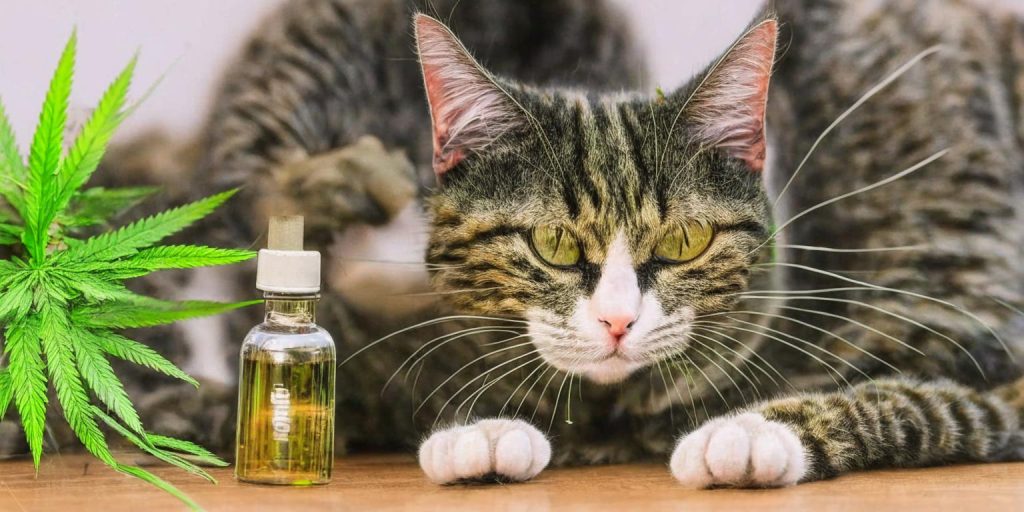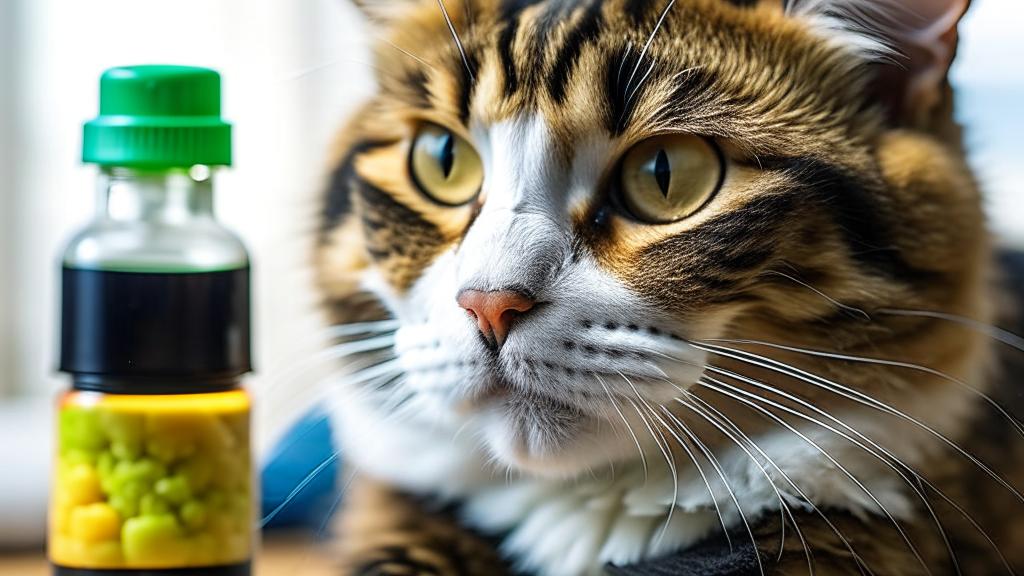
Many cat owners have become interested in the emerging trend of using cannabis products for pet healthcare, particularly those who are eager to ease their feline companions’ discomfort. Cannabis is becoming more and more common in veterinary care as it becomes more readily available for human use in many states for both medicinal and recreational purposes. However, using cannabis to treat animals is not a simple process. Further layers of complexity are created by the complex and politically charged history of cannabis use, as well as the intricate interplay of state and federal laws. This is clear from the regulations that prohibit veterinarians from discussing cannabis options with pet owners in some areas. Still, there’s a change toward greater transparency.
In 2021, Nevada set a precedent by legalizing cannabinoids for veterinary use. This paved the way for other states like Michigan, Utah, and California to enact laws explicitly allowing veterinarians to discuss and recommend CBD (cannabidiol) for pets. CBD, a component of the cannabis plant, is commonly used for treating various ailments in cats. Importantly, it’s distinct from THC (delta-9-tetrahydrocannabinol), the psychoactive element in cannabis that produces the ‘high’ in humans.
Veterinarian Perspectives on Cannabis for Cats
Dawn Boothe, DVM, a board-certified veterinary clinical pharmacologist and professor emeritus at Auburn University, highlights the complexities surrounding the use of cannabis in veterinary medicine. “The regulatory landscape is in flux and still evolving. We are hopeful that rationality will soon guide these laws, but we’re not quite there yet,” she remarks.
Boothe points out that while a plethora of hemp-based CBD products are available online, their legal status only adds to the uncertainty. These products, marketed as supplements, lack human and veterinary medicine regulatory oversight. They need to be evaluated by the FDA, leading to a significant dilemma for pet owners. There are few reliable sources to answer crucial questions about these products, such as their quality, effectiveness, and safety for cats.
Potential Benefits of CBD for Feline Health Issues
Despite the existing regulatory challenges, Dr. Dawn Boothe suggests that current knowledge indicates CBD’s potential effectiveness in addressing several common cat ailments. These conditions include:
Epilepsy: CBD may offer relief in managing seizures in cats, similar to its use in humans.
Arthritis Pain: Cats suffering from arthritis may experience pain relief with CBD treatment.
Cancer-Related Pain: CBD can be a supportive therapy for alleviating pain associated with cancer.
Appetite Stimulation: It can help maintain the appetite of cats during illness, ensuring they continue to eat.
Behavioral Disorders: There’s potential for CBD to help in managing certain feline behavioral issues.
Chronic Vomiting: This condition, often distressing for cats and their owners, may be alleviated with CBD.
Gastrointestinal Upset: Particularly in older cats, CBD might offer relief from gastrointestinal discomfort.
Dr. Boothe emphasizes the need for well-structured, controlled clinical trials in cats, akin to those conducted in human medicine, to validate these potential benefits fully. She notes the lack of such comprehensive studies in the feline field, which are essential to establish the efficacy and safety of CBD in treating these conditions in cats.
Integrating CBD with Conventional Veterinary Treatments
Dr. Trina Hazzah, a veterinary oncologist with credentials in Chinese herbal medicine, has observed a growing demand from her clients for holistic treatments for their cats. She recognizes cannabis, specifically CBD, as a valuable option in this realm.
Hazzah notes the cannabis plant contains over 700 compounds, many with medicinal properties. Research, particularly on CBD and THC, has shown significant anti-cancer effects, as indicated by over a hundred publications. Beyond cancer treatment, cannabis plays a crucial role in enhancing the overall quality of life for ailing cats. It’s often used in conjunction with traditional veterinary care to offer a more comprehensive treatment approach.
According to Hazzah, cannabis can significantly improve a cat’s well-being. It helps stimulate the appetite, reduce nausea, and alleviate pain. The result is a more sociable, happier cat that engages more with its surroundings. Even cats undergoing stressful treatments like chemotherapy can benefit from cannabis. It can reduce stress, pain, and nausea, leading to a markedly improved quality of life during therapy.
In 2020, recognizing the need for more awareness and support in this area, Dr. Hazzah co-founded The Veterinary Cannabis Society. This U.S.-based nonprofit organization is dedicated to educating about the use of cannabis as a medicinal option for pets. The Society also works with veterinarians and state licensing boards to address legal challenges and facilitate more accessible communication of cannabis-related advice to pet owners.
Exercising Caution When Purchasing CBD for Cats
When considering CBD as a treatment option for your cat’s symptoms, it’s vital to ensure that you’re choosing a safe and high-quality product. Here are some steps to help you make an informed decision:
Seek Veterinary Recommendations: Consult with your veterinarian about CBD treatments that have undergone clinical trials or have been the subject of scientific research. Their expertise can guide you towards reliable products.
Look for Transparency in Manufacturing: Reputable CBD manufacturers will provide certificates of analysis for their products. These certificates should confirm the absence of pesticides and impurities, ensuring product safety.
Utilize Resources Like the National Animal Supplement Council: This council can provide additional data and insights on various CBD products, helping you make a more informed choice.
However, be aware of the prevalence of counterfeit and mislabeled products. Recent studies have revealed that many cannabis products are inaccurately labeled concerning their active ingredients, posing a risk to pet health.
To address these concerns, the Veterinary Cannabis Society is developing a seal-of-approval program. This program aims to establish and enforce standards for veterinary CBD products, although it is still a few years from implementation. Until then, pet owners should exercise caution and seek advice from trusted veterinary professionals when selecting CBD products for their cats.
Administering CBD to Your Cat: Guidelines and Precautions
Administering medication can often be challenging, as many cat owners can attest to their battle scars. This challenge extends to CBD, which comes in various forms, including chews, oils, treats, and tinctures, each with its own absorption method. This variety makes it difficult to gauge how much CBD your cat receives.
Optimal Administration Method: Tinctures, which are mixtures of CBD in an oil base, are often considered the most effective way to administer CBD. It’s crucial to ensure that these tinctures do not contain alcohol, which is harmful to cats. Medicines allow for precise dosage adjustments, drop by drop. Once you determine the correct dose for your pet (e.g., 2 milligrams), consider other forms like chews or treats with the exact dosage, depending on what your cat accepts best.
Easing Access to CBD for Cats
At recent American Veterinary Medical Association conferences, experts have discussed the therapeutic potential of certain cannabis compounds. The growing interest and demand from pet owners may influence the availability of CBD treatments for cats, even in states with stringent cannabis regulations.
The Importance of Professional Guidance in Using CBD
Self-diagnosing and prescribing CBD or any treatment for your cat can be risky. Certain cannabis compounds might have adverse effects, especially in cats with heart conditions. Dr. Boothe emphasizes the relative safety of CBD products but warns against neglecting traditional therapies in favor of unproven alternatives. She advocates for using CBD in conjunction with established treatments, believing in its potential but stressing the importance of professional veterinary guidance to avoid putting pets at risk. This balanced approach ensures that pets receive the benefits of CBD while minimizing potential harm.
In conclusion
CBD oil can be a safe and beneficial supplement for cats. It’s crucial to consult a veterinarian to determine the correct dosage and ensure it’s administered correctly. CBD oil may help alleviate various cat health issues, including inflammation, anxiety, and pain related to arthritis or cancer. However, it’s important to note that while CBD is generally safe, THC can be toxic to pets. Therefore, always choose high-quality, pet-specific CBD products approved by a veterinarian. Lastly, never try to diagnose or prescribe treatments independently; always seek professional medical advice for your pet’s health.


